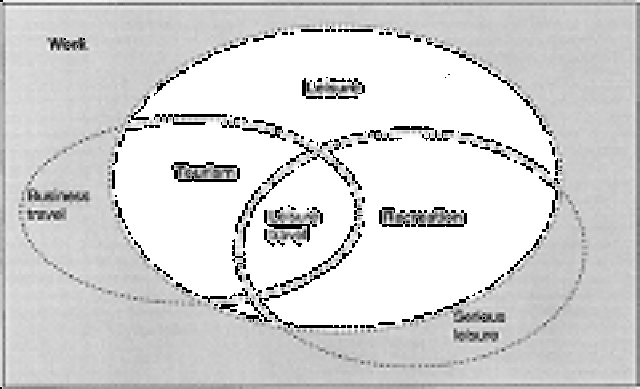Geography Reference
In-Depth Information
Figure 1.1:
Relationships between
leisure, recreation and tourism
as wilderness management, social carrying capacity and non-market valuation of
recreation experiences. In contrast, tourism has tended to have a more 'applied
orientation' which concentrates on traditional private sector (i.e. tourism industry)
concerns, such as the economic impacts of travel expenditures, travel patterns and tourist
demands, and advertising and marketing (Harris et al. 1987).
Although the division between public and private activities may have held relatively
true from the end of the post-war period through to the early 1980s, in more recent years
the division between public and private sector activities has been substantially eroded in
western countries (Hall and Jenkins 1995). The distinction between tourism and
recreation may therefore be regarded as one of degree. Tourism primarily relates to
leisure and business travel activities which centre around visitors to a particular
destination, which will typically involve an infusion of new money from the visitor into
the regional economy (Hall 1995). According to Helber (1988:20), 'In this sense, tourism
can be viewed as a primary industry which, through visitor spending, increases job
opportunities and tax revenues, and enhances the community's overall economic base'.
On the other hand, recreation generally refers to leisure activities which are undertaken
by the residents of an immediate region, while their spending patterns will involve 'a
recycling of money within the community associated with day, over-night and extended-
stay recreation trips' (Helber 1988:20-1).
Natural settings and outdoor recreation opportunities are clearly a major component of
tourism, perhaps especially so since the development of interest in nature-based and
ecotourism activities (e.g. P.Valentine 1984, 1992; Weiler and Hall 1992; Lindberg and
McKercher 1997). Indeed, outdoor recreation and tourist resources should be seen as
complementary contexts and resources for leisure experiences (Fedler 1987).
Nevertheless, while authors such as Pigram (1985:184) take the view that 'tourism is
carried on within an essentially recreational framework', others such as Murphy (1985)

